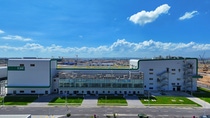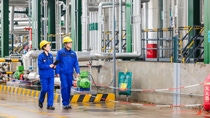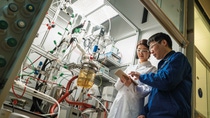BASF in Greater China 2023
Innovation
Innovation is the bedrock of BASF’s success as a leading chemical company and is the key driver for its profitable growth.
China is now the largest chemical market in the world and there is a growing demand for more sustainable products and solutions.
We focus on developing sustainable solutions for our customers by helping them to reduce their products’ carbon footprint, to use resources more efficiently or to manufacture products in a more eco-friendly way. This is how we safeguard our competitiveness in the long term and make our contribution to the society.

In 2023, BASF completed the expansion of Innovation Campus Shanghai with two new R&D buildings, bolstering innovation and collaboration with customers in China and Asia Pacific.
Growing R&D capabilities in China
BASF has been continuously expanding its research and development footprint in China to drive innovation by integrating customer and market needs at an early stage.
- Total investment in Innovation Campus Shanghai of around €280 million
- Growing R&D capabilities will further accelerate innovations for BASF’s customers in China and across Asia
The Innovation Campus allows BASF to bring together all the stakeholders in the innovation chain including research and development (R&D), business and production units in an integrated site. Innovation Campus is an integral part of BASF’s global Know-How Verbund and runs global, regional, and local R&D projects.
The Innovation Campus Shanghai, located at the BASF Shanghai Pudong Innovation Park, was inaugurated in 2012, and expanded in 2015, 2019 and 2023. Combining technical development capabilities of the operating divisions with industrial design expertise, the Innovation Campus Shanghai serves the demand of almost all major industries.
In 2023, BASF inaugurated the expansion of its Innovation Campus Shanghai, consisting of two new research and development (R&D) buildings. The company has invested a total of €280 million since 2012 to its Innovation Campus Shanghai, thus enhancing its innovation capabilities and better supporting its customers in China and across Asia. The expansion includes new facilities and laboratories that are used to advance chemical research projects and create new sustainable solutions.
BASF Shanshan Battery Materials Co., Ltd, a joint venture of BASF (51%) and Shanshan (49%) has already built up mature supply to customers with a closed-loop offering including raw materials, precursors, cathode active materials and recycling. Cathode active materials play a crucial role in improving the performance of lithium-ion batteries in electric vehicles and consumer electronics. BASF Shanshan Battery Materials focuses on independent research and development and already has obtained strong technical innovation strength. With its advanced innovation center, strong R&D platform and patent matrix, as well as the synergy of BASF’s global innovation network, researchers of BASF Shanshan Battery Materials are now working together to accelerate product and application development which meets the diverse needs of customers in China and around the world and make e-mobility a reality for everyone.
Driving open innovation with academia and industry
BASF places great value on open innovation through close collaboration with academic and industry partners around the world.
- The Network for Asian Open Research (NAO) promoting collaboration between BASF and researchers in Asia
- BASF and National Natural Science Foundation of China (NSFC) collaborated to advance green process value chains towards carbon neutrality
- “BASF-IOPLY joint research center for e-mobility and energy storage" unveiled in Liyang, Jiangsu province
BASF maintains a global network of around 280 partners from universities, institutes, and companies, forming a key pillar of BASF’s global Know-How Verbund. In Asia Pacific, the Network for Asian Open Research (NAO) has been a joint platform steered by BASF as well as leading universities and institutes in the region since 2014.
Since the establishment of NAO, BASF and its partners have completed more than 170 joint research projects. Currently, NAO projects cover a wide range of research areas including sustainable materials, advanced process, digitalization, smart manufacturing, as well as solutions for e-mobility.
In 2023, BASF was recognized as one of the "Blue Whale 50 – Top 50 Global Large Enterprises in Open Innovation" by the Technology Innovation Research Centre of Tsinghua University (TIRC) and Plug and Play China. A judging panel of renowned academic and industry experts commended BASF's commitment to scientific and technological innovation, particularly its advancements in open innovation.
In 2023, BASF and National Natural Science Foundation of China (NSFC) signed a Letter of Intent for Cooperation (LOI) to drive joint innovation and to advance green process value chains towards carbon neutrality targets. The collaboration brings together industry innovation capabilities of BASF and capabilities of NSFC in supporting fundamental research and original innovation. The LOI focuses on research into sustainable process technologies, for example, development of new catalysts and reactors, utilization of carbon dioxide as raw materials, advanced digital tools, and analytical methods. The joint cross-industry research and development will accelerate the transfer of green process value chains into industrial applications.
BASF and South China University of Technology (SCUT) signed a strategic partnership framework agreement, covering various fields including innovative technology development, universityindustry collaboration, and talent development in June 2023. Through this partnership, BASF and SCUT aim to deepen the cooperation and build an innovation eco-system with the focus on chemicals, materials, and industrial intelligence solutions. Both parties will identify the research directions based on technologies,
BASF and Yangtze River Delta Physics Research Center (IOPLY), a science and technology innovation enterprise, in July 2023 unveiled a joint research center in Liyang, Jiangsu province. Named “BASF-IOPLY joint research center for e-mobility and energy storage” (BIRC), this joint research center aims to accelerate innovations in advanced materials and solutions for e-mobility and energy storage. Under the agreement, both parties will collaborate on materials and solutions for battery cells and packs with focus on solid-state batteries (SSB) and sodium-ion batteries. These are widely considered to be the next generation batteries for e-mobility and energy storage, respectively. At the same time, both parties will leverage digital R&D capabilities to improve innovation efficiency. Liyang is a thriving hub for the new energy industry. BIRC will leverage the strengths of industry cluster in the city and collaborate with partners along the value chain to drive joint innovation and accelerate time to market.








